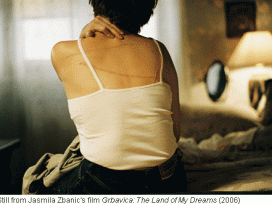Europe’s collective memory is as diverse as its nations and cultures and cannot be regulated by official acts of state or commemorative rituals, writes Claus Leggewie. The most significant challenge for a European memory is to reconcile “competing” memories of the Holocaust and the Gulag. Yet other historical experiences must also be integrated: memories of wartime and expulsion, of colonialism and immigration, and not least of the “success” of the European Union.
Articles
Read more than 6000 articles in 35 languages from over 90 cultural journals and associates.
Vindictive, politicized, conspiratorial, reckless: one need not agree with WikiLeaks’ modus operandi to acknowledge its service to democracy. Geert Lovink and Patrice Riemens see in WikiLeaks indications of a new culture of exposure beyond the traditional politics of openness and transparency.

Attempts to prevent the shooting of a film about mass rape in Bosnia equalled an attempt at censorship, argues Slavenka Drakulic: this kind of response perpetuates misunderstandings about war crimes and overlooks the real problems facing Bosnian victims of mass rape today.
Utopian failing
Two magazine projects
Depression, revolution and the threat of fascism provided the impetus for Bertolt Brecht’s and Walter Benjamin’s magazine “Krise und Kritik” in the 1930s; thirty years later, in a world shaped by decolonization and bloc confrontation, Maurice Blanchot’s “Revue Internationale” was a similar attempt at an engaged form of publishing. Yet its internationalist ambitions ultimately proved to be its downfall, writes Roman Schmidt.
Territory, identity, transformation: A Baltic-Balkan comparison
A Baltic-Balkan comparison
Lithuania and Bulgaria: two nations on the peripheries of central Europe, both bearing strong traces of former Empires. Subjected to neoliberal forces of disintegration, historical identities re-pattern along new lines of conflict, the politics of ’89 now redundant in the regulated zone of market democracy that is new Europe. Ivaylo Ditchev and Tomas Kavaliauskas share Baltic-Balkan perspectives on the present.
What distinguishes Semih Poroy among his peers is the prevalence of humour in his drawings, writes Tan Oral. Poroy’s special connection with the literary world adds another dimension to his work and is depicted through critical, humorous and ironic observations by a cartoonist truly enjoying the world of letters.
Faith in the “efficient markets hypothesis” is largely to blame for the massive deregulation of the late 1990s and early 2000s that made the crisis more likely, if not inevitable. Two economists excoriate the ideology of self-regulating markets and its pseudo-scientific foundations.
Contain this!
Leaks, whistle-blowers and the networked news ecology
WikiLeaks’ series of exposés is causing a very different news and informational landscape to emerge. Whilst acknowledging the structural leakiness of networked organisations, Felix Stalder finds deeper reasons for the crisis of information security and the new distribution of investigative journalism.
The pragmatist renunciation of sociology’s critical exclusivity is reversed in the recent thought of Luc Boltanski, as capitalist “displacements” to the world of work together with new and complex forms of domination demand the return to a critical methodology. Unlike others of his generation, however, Boltanski’s arguments for change do not extend to democracy itself, writes Boyan Znepolski.
Once wildly popular, President Obama is now under fire from all directions. Is it because his thinking is too complicated for an age of sound bites, asks George Blecher, or does he lack the kind of passion that the American electorate thrives on?
Following the political logic of pop-cultural palaeontology, Hungary’s resurgent far-Right excavates archaic cultural identities for the youth of today, writes Zsófia Bán. Mythical symbols of national strength fill the historical void felt by post-’89 generations, whom even the cathartic moment of regime change fails to unite.
Stuttgart’s residents are furious over plans to convert the city’s existing rail terminus into an underground through-station. In October, 150 000 demonstrators gathered in the city’s central park, which will disappear if building goes ahead. Supporters of the prestige project argue that the conversion of the station, together with the construction of a new high-speed stretch, is essential if Stuttgart is to become a stopping point on the new “magistrale” between Paris and Budapest. Yet critics point to exorbitant costs, misguided rail policy and misuse of public funds.
For Aleksandr Solzhenitsyn, modernism was a sinister force, especially in Russia, where it foretold “the most physically destructive revolution of the twentieth century”. Richard Tempest explores Solzhenitsyn’s overt and covert (dis)engagement with Russian and European modernism, arguing that he employed modernist means to achieve anti-modernist ends.
The comic book Tintin in the Congo has been charged with racism in a Brussels court for its display of colonial attitudes from the 1930s. Morten Harper re-reads “countercultural” Norwegian comics and reveals how there, too, humour functions at the expense of minorities.
Of course we should love, honour and cherish our species, says British moral philosopher Mary Midgley. But should we have to worship it too?
Author Janice Galloway reveals her lifelong fascination with Pieter Breugel the Younger, whose love of the “ordinary”, she believes, chimes with the Scottish character.